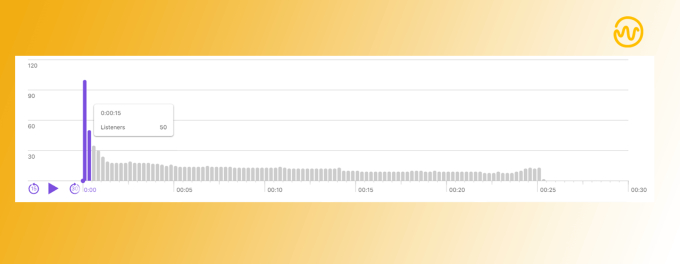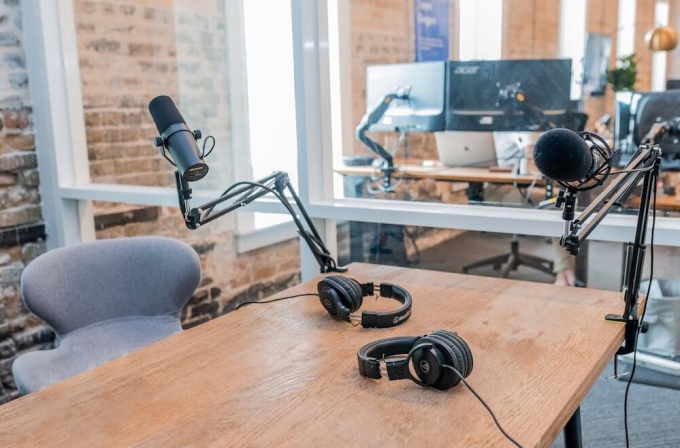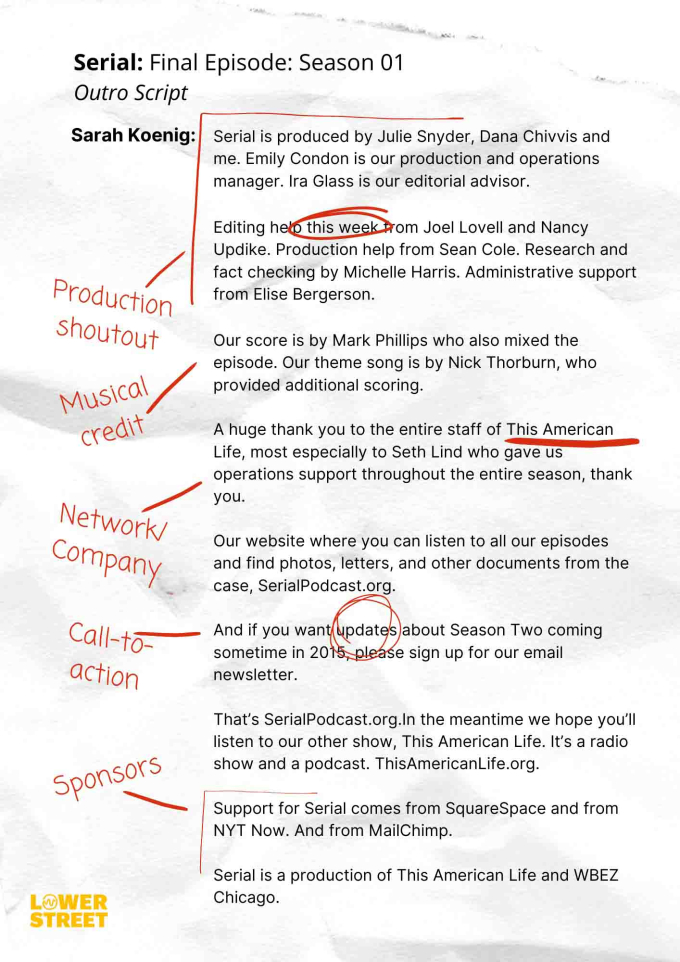How to Write a Podcast Outro Script to Close Your Show in Style
Contents

All good podcasts start with a compelling intro and end with a satisfying outro. While the intro is the starting point of a podcast episode that strives to answer "what's in it for me" for listeners, an outro is usually a podcaster's last chance to make an impression.
Once you finish recording your episode, knowing exactly how to end a podcast can be tricky. Many new podcasters struggle to wrap up their show effectively.
So, to combat the nerves, build an outro script before recording.
Why Are Podcast Outros Important?
The outro, or final act, of your podcast is your opportunity to neatly close any loops opened during the main body of your episode. It's all about creating a satisfying end, one which rewards listeners for committing to your show and sticking it out.
Failure to do so will likely turn new listeners away from becoming loyal followers. Leaving too many questions unanswered and challenges unresolved means, at best, listeners will consider your podcast forgettable. At worst, they'll feel duped.
With only 52% of listeners tuning into an entire podcast episode, it's not only essential to ensure your audience is enjoying themselves right out of the gates, but that those who do stick around walk away with a sense of value from the listening experience.
What's more, listeners who stay until the end of an episode have more than likely connected within your content—making them much more responsive to your calls-to-action.
Your Outro's Goal
Done right, your outro can achieve a lot. These are some of the things you should aim for at the end of a show:
Convert listeners into subscribers
Ask for and share listener reviews
Showcase your social media, website, merchandise, or sponsors
Credit your collaborators, such as your producer, network, designer, or composer
Promote future episodes
Clarify topics discussed in the episode
Similar to your podcast intro, there are no official "rules" as such, but if you want to close your episode on the right note there are some essential factors to consider.
Set Your Podcast Up the Right Way: The Intro
The average podcast loses 20 to 35 percent of listeners in the first five minutes. For listeners to make it to the end of your podcast, you need to have a great hook that keeps them reeled in.
Your intro segment is vital in setting the tone and laying out the key information a listener needs to connect with you. Show new listeners who you are, what your podcast is about, and why they should listen.

Here's a quick rundown of what you can include in your podcast intro:
Name the host(s): Introduce yourself and any co-hosts in a few sentences.
Tell your audience what you're about: For example, "Welcome to the [name] podcast, where we discuss building a brand identity from the ground up with successful entrepreneurial leaders from across the globe. Today, we're going to be discussing how to prioritize tasks."
Always mention your podcast title: Not all of your new listeners will know who you are—so never assume.
What's in store: Be clear about the ground you're going to cover (without going into too much detail). This can help new audiences get a better idea of the content you cover.
10 Key Elements of a Successful Podcast Outro
Now that you have the intro dialed in, how do you structure an outro script? Every successful podcast outro should do the following three things:
Be valuable to your listeners
Keep their attention
Add value to your episodes
Remember that there is no "one size fits all" approach to outros. It depends on your audience, their wants and needs, and the overall goals you want to reach with your podcast.
Think of it like this. The intro sets up the listener for what's in store, while the meat of the podcast discusses the central message of the recording. Your outro should summarize the episode and conclude with some form of actionable "next step."
We've also included some sample outro scripts for the different sections further down to get your creative juices flowing.

1. General Podcast Information
Start your outro by doing a little housekeeping. Mention the podcast's name, the host's, co-host's and guest's names, as well as how listeners can get in touch with you.
While it may feel like you're over-egging the pudding by going over familiar ground again, you must remember that this repetition serves as an "orientation" to any new listeners. It's also the ideal way to help cement and build your brand in the minds of your audience.
2. Take Your Time
Writing your outro shouldn't be a rush job. Instead, it would help if you carefully consider the points you need to hit upon. Depending on your podcast's format, you can either write out any bullet points you want to touch upon, or draft a complete script to read verbatim.
Having at least a few bullet points of what you want to touch upon ensures you don't ramble. Instead, it gives you a guide to say what you need to say, in the way you mean to say it.
3. Thank Your Listeners
Your listeners are the life force of your podcast. Your show wouldn't exist without them. Make your audience feel valued, acknowledged, and included enough to return.
For most people, creating a podcast is to bring visibility and credibility to a brand. Listeners consuming the entirety of a podcast's content are the ones who will most likely interact with a brand outside of this marketing channel.
"It's much more about community now than it probably ever has been. Acknowledging that and ensuring that they're being heard and listened to and that they're part of your experience is really important to them."
—Ryan, Lower Street producer
Listeners essentially give up their valuable time, so thank them for being part of your community. Saying "thank you" doesn't have to be a grand gesture; just a simple 'thanks for listening' will do.
4. Thank Your Guests
Having a guest on your podcast helps to enrich your content. While you may not need to bring a guest onto your podcast, doing so can help build up your network with new people, promote your show to new subscribers, and fill your latest content with expert information.
So, without exception, you must thank your guests for appearing on your podcast. Tell your audience where to find them, mention their website, new book, social media handles, etc.
5. Thank Your Team
Most podcasts are a team effort, so it's only polite to thank those who have made the show possible. This "thank you" list could include anyone from the hosts and guests who appeared on the episode to the producers, editors, writers, researchers, transcriptionists, and graphic designers!
The podcast outro is ideal for listing the credits. Keep this list as short as possible though, otherwise you risk your listeners stopping the episode before you're done. You may want to put a complete list within your show notes for longer credit lists.
Here's how Sarah Koenig from Serial did it:

6. Recap the Episode: Summarize Your Thoughts
Podcasts are often consumed on the move, with 86.1% of listeners using their cell phones rather than computers. That means while someone may have pressed play on an episode, they're more than likely doing it in tandem with another task.
The most effective way for a human to remember something is through repetition. Your podcast outro is the perfect place to recap the key takeaways covered within your episode.
Help your listeners consolidate their new knowledge and get the information they may have missed by mapping out what they (and you) have learned in a bulleted list.
7. Sponsored Messages
If you have a podcast sponsor, you may be asked to do a post-roll ad (an advert at the end of the podcast). It all depends on your specific sponsorship agreement.
The podcasts that get asked to create pre-roll and mid-roll ads will often thank their sponsors again in their episode outro. Overall, thanking sponsors is a common courtesy that could see you gaining another advertisement opportunity in the future.
Example: "Thank you for listening to the MRC Podcast. This podcast has been brought to you by our sponsor ____. "
or
"Thanks again to our sponsor ___ for sponsoring this show. "
According to Podchaser, the average podcast ad word count is:
10-second ad = 24 words
15-second ad = 36 words
30-second ad = 72 words
60-second ad = 144 words
Basic Sponsor Script Idea: "Today's episode is brought to you by [sponsor name]. [Sponsor name] is [speak about the benefits of the sponsor's product or service and why the listener should buy it or be interested in it]."
8. Call-to-Action (CTA)
It's not just about keeping listeners engaged within an episode, the actions listeners take outside the podcast also count. If you think about it, most podcasts are available for free. So, why not ask for something in return? A podcast CTA is a request for listeners to do something.
Some of the most common podcast outro CTAs include:
Subscribe to your podcast
Leave a rating and review
Visit your website to join an email list or find extra resources and info
Follow you on social media
Buy your or your sponsor's products, merchandise, tickets, etc.
Example: "If you enjoyed this episode and you'd like to help support the podcast, please subscribe and leave a rating and review. To stay up to date with [the podcast's name] and get all the behind-the-scenes content, you can follow me on Instagram [@UserName] and on Twitter [@UserName]."
Whatever CTA you pick depends on the action you want your listeners to take. For example, if you're just starting out and looking to build your status within Apple Podcasts, asking for a subscription, rating, and review can help.
Or, if increasing download numbers is a must, then asking listeners to recommend you to friends and family could be your best bet.
The most important reasons to include a podcast call-to-action are as follows:
Grow your audience
Email or contact information capture
Generate leads
Draw listeners to your website(s)
Make a sale
Endorse a product/service
Each podcast CTA is going to depend on that show's goal. Most of the time it will be a combination of things. For example, many podcast hosts ask for a rating and review, plus a visit to their website for more information and show notes.
Those looking to expand their network and community may decide the most important thing is to draw listeners towards their website to opt-in for some free downloadable—all to add them to their email list.
Your CTA should be attention-grabbing, but also short and sweet.
Example: "Make sure you hit subscribe if you haven't already, and sign up for your free podcast marketing checklist on our website!"
9. Tease the Next Episode
Encourage your listeners to tune into the next episode by adding an audio teaser of an upcoming episode. While this isn't a staple for podcast outros, teasers add that extra layer of intrigue.
Some podcasters will quickly mention who the guest will be and the topics they'll cover. Others choose to use audio snippets to add another dimension to their show.
10. Ask for Feedback and Reviews
Podcasts live and die by their audiences. So, as a podcaster you need to understand how your podcast is being received out in the world.
The thought of asking for feedback on something you've worked hard on may not sit well with many of us. But understanding the softer information behind your audience, like their interests, values, and opinions, can help shape your content moving forward.

How to Get Feedback
Tell your listeners where and how to leave reviews and ratings
Make it easy for them to do so by providing instructions and clear calls-to-action across all your channels and within your podcast outro
Reward your listeners for leaving reviews by giving shout-outs and engaging with feedback
Audience members/listeners leave reviews because they want to help. More often than not, if they have any negative comments they will probably attempt to deliver them with kid gloves. Don't be afraid of feedback, it is amazing at helping your podcast evolve.
Final Thoughts
Your podcast outro is an effective place to market your podcast by showcasing your personality and your overall brand. It's the finale of an audio journey. As we said, listeners who stay until the end of an episode have more than likely found value within your content, so make your outro the cherry on the cake.
Summarize the content, and go over the poignant points and messages from within the episode. Show gratitude to your team, guests, and audience. And, of course, remember to have fun with it.
Thinking about launching a podcast for your brand?
If you need a hand launching, producing, or promoting your branded podcast, the Lower Street team is here to help. Get in touch for a free consultation.
Contact us
![How to Write a Podcast Script [With Examples] | Lower Street](/img/containers/main/img/script-writing.jpg/18778dd8f0cd2602adcb962c41e9d5e9/script-writing.jpg)
![How to Write a Podcast Description [2024]| Lower Street](/img/containers/main/img/description1.jpg/deb4cd03f23854de55c88534a3d11f59/description1.jpg)

![Blog vs Podcasts: Which is Best for Business Marketing? [2026]](/img/containers/main/img/hero-blog-vs.-podcast-1640267450.jpg/3b30a138cc11e6c5812f35cbb2626d16/hero-blog-vs.-podcast-1640267450.jpg)